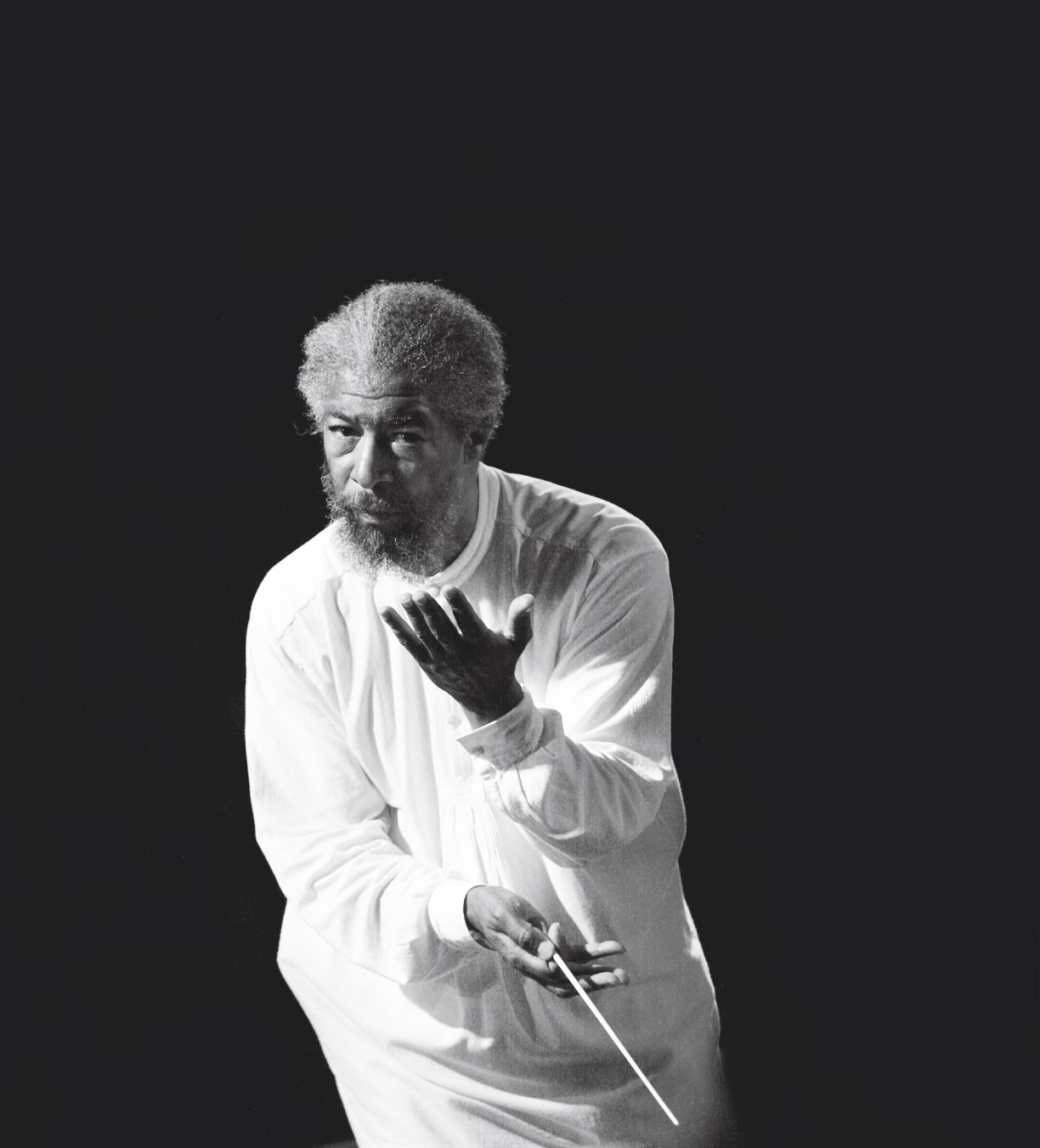The cornetist, composer and longtime ISSUE Artistic Advisory Board Member Lawrence D. "Butch" Morris, who died in 2013, invented a new approach to orchestral music he called "conduction," a way of composing in real time by conducting improvising musicians. To celebrate his legacy, and on the occasion of the publication of The Art of Conduction: A Conduction® Workbook (New York: Karma, 2017), ISSUE Project Room and the London Review of Books have organized a panel on Morris and other radical black composers who have explored the liminal space between European avant-gardism and the African-American vernacular tradition, between notated music and improvisation, between structure and freedom.
The panel, moderated by Contributing Editor of the London Review of Books, Adam Shatz, features Greg Tate, a critic, guitarist and leader of Burnt Sugar; the composer and trombonist George E. Lewis, the Edwin H. Case Professor of American Music at Columbia University and author of A Power Stronger Than Itself, a history of the Association for the Advancement of Creative Musicians; the composer and singer Mary Jane Leach, co-editor of Gay Guerilla: Julius Eastman and his Music; and guitarist, composer, singer and songwriter, Brandon Ross.
The evening also features a performance by Ross's ensemble Phantom Station, featuring J.T. Lewis on drums, Graham Haynes on cornet and electronics, and the sound designer Hard Edge.
Trumpet player Butch (Lawrence Douglas) Morris (1947-2013) was perhaps the most revolutionary conductor of big bands of the post-swing era. An alumnus in Los Angeles of Horace Tapscott's Pan Afrikan Peoples Arkestra, itself an outgrowth of the Underground Musicians' Association (UGMA), formed in 1961, Morris relocated to New York in 1976, and became a member of David Murray's band (1982-97). The aim of multimedia events such as the 47-minute Current Trends In Racism (February 1985) was to transform the performance of an orchestral work into an improvised duet between the conductor (Morris) and the orchestra -- a type of structured free improvisation where Morris directed and conducted an improvising ensemble with a series of hand and baton gestures. In this form, Morris single-handedly directed and shaped a distinctive form of large-ensemble music built on collective improvisation.
Adam Shatz is a contributing editor at The London Review of Books and a contributor to The New York Times Magazine, The New York Review of Books, The New Yorker, and other publications. He has been a visiting professor at New York University and a fellow at the Dorothy and Lewis B. Cullman Center for Writers and Scholars. Raised in Massachusetts, he studied history at Columbia University and has lived in New York City since 1990.
Greg Tate is a writer and musician who lives in Harlem. A founding member of the Black Rock Coalition, Tate played guitar and co-led the BRC affiliate band Women In Love which included future Burnt Sugar members Mikel Banks, Jason Di Matteo and Lewis Flip Barnes in the 90s. In 1999 he and Jared Nickerson formed Burnt Sugar which has, to date, produced 16 albums under Tate’s direction on Burnt Sugar’s own Avant Groidd imprint. Tate’s writings on culture and politics have also been published in the Village Voice, The New York Times, The Washington Post, Artforum, Rolling Stone, VIBE, Premiere, Essence, Suede, The Wire, One World, Downbeat, and JazzTimes. He has also written on visual art (Museum of Modern Art, The Whitney Museum, ICA Boston, ICA London and more), many books (Everything But The Burden, What White People Are Taking From Black Culture, Midnight Lightning: Jimi Hendrix and The Black Experience, and more) and a few plays (including My Darling Gremlin scored by Butch Morris).
George Lewis is the Edwin H. Case Professor of American Music at Columbia University. A 2002 MacArthur Fellow, Lewis studied composition with Muhal Richard Abrams at the AACM School of Music, and trombone with Dean Hey. A member of the Association for the Advancement of Creative Musicians (AACM) since 1971, Lewis’s work has been presented by the BBC Scottish Symphony Orchestra, London Philharmonia Orchestra, Talea Ensemble, Ensemble Pamplemousse, Wet Ink, Ensemble Erik Satie, and others, with commissions from American Composers Orchestra, International Contemporary Ensemble, Ensemble Either/Or, San Francisco Contemporary Music Players, Library of Congress, 2010 Vancouver Cultural Olympiad, IRCAM, Glasgow Improvisers Orchestra, and others. Lewis has served as Paul Fromm Composer in Residence, American Academy in Rome; Resident Scholar, Center for Disciplinary Innovation, University of Chicago; and Ernest Bloch Visiting Professor of Music, University of California, Berkeley. Lewis received the 2012 SEAMUS Award from the Society for Electro-Acoustic Music in the United States, and his 2008 book, A Power Stronger Than Itself: The AACM and American Experimental Music (University of Chicago Press) received the American Book Award.
Mary Jane Leach is a composer/performer whose work reveals a fascination with the physicality of sound, its acoustic properties and how they interact with space. In many of her works Leach creates an other-worldly sound environment using difference, combination, and interference tones; these are tones not actually sounded by the performers, but acoustic phenomena arising from her deft manipulation of intonation and timbral qualities. The result is striking music which has a powerful effect on listeners. Critics have commented on her ability to "offer a spiritual recharge without the banalities of the new mysticism" (Detroit Free Press), evoking "a visionary quest for inner peace" (Vice Versa Magazine), and "an irridescent lingering sense of suspended time." (Musicworks Magazine) Leach's music has been performed throughout the world in a variety of settings, from concert stage to experimental music forums. In recent years Leach has received considerable acclaim for her choral music. Drawing on inspirations as diverse as Monteverdi, Bruckner, and 14th century Ars Nova, these pieces "enliven a choral repertoire starved for good contemporary work." (Village Voice).
Brandon Ross is a New York City-based guitarist/composer/singer/songwriter. As a performing and recording artist, Ross has collaborated with many innovative voices in modern music, such as Wadada Leo Smith, Cassandra Wilson, Henry Threadgill, Tony Williams, Arto Lindsay, Leroy Jenkins, Lawrence D. "Butch" Morris, Bill Frisell, Me'Shell N'degeocello, Oliver Lake, Muhal Richard Abrams and many others, crafting a personal approach to guitar and improvisation which has taken him all over the world. Ross also leads, For Living Lovers, his Chamber Music for Improvisers acoustic duo with acoustic bass guitarist, Stomu Takeishi. The duo's debut release, "Revealing Essence" (2014) on Sunnyside Records was called "... another masterpiece ... " - John Garrat, of Pop Matters; honored by superlative reviews and year-end "best of ..." lists. A co-leader the avant power trio, Harriet Tubman, (with bassist Melvin Gibbs, and drummer JT Lewis), in Harriet Tubman, Ross uses electronics, and pan-tonality to sculpt a multidimensional, interactive, sonic language. The band's latest studio album, "Araminta", was released to outstanding acclaim in February 2017. Ross is a 2014 Chamber Music America New Jazz Works grantee, an ASCAP Foundation commissioned composer; Rockefeller Foundation MAP Grant recipient; NYSCA Composition grant recipient, and ASCAP writer and publisher member.
THIS IS AN OFFICIAL 2017 BROOKLYN BOOK FESTIVAL EVENT




